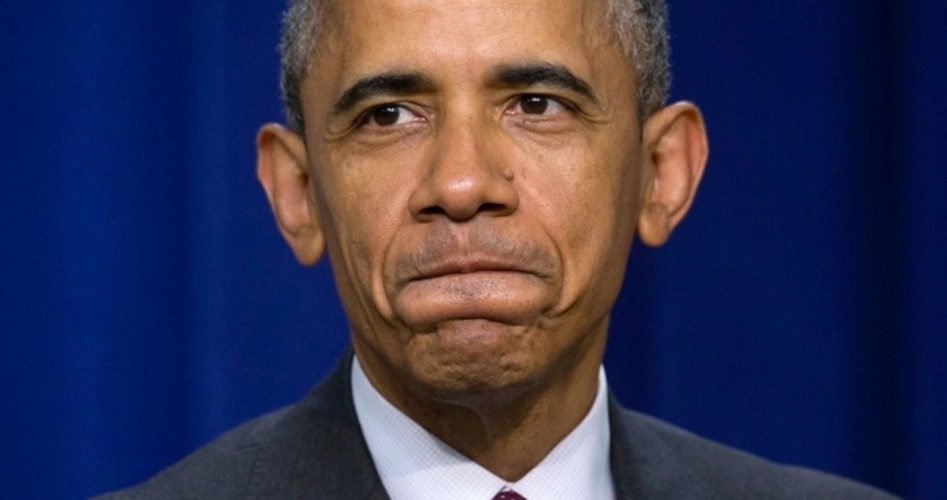
Senate Democrats Tuesday threw up a hurdle on the “fast track” that President Obama and Republican “free trade” advocates couldn’t clear. A move to end the Democrats’ filibuster and bring the Trade Promotion Authority to the Senate floor got the backing of a 52-45 majority, falling short of the 60 votes needed to cut off debate. The TPA would give the president authority to negotiate trade agreements that Congress could vote only up or down, without amendments or filibusters. Sen. Tom Carper of Delaware was the only Democrat to vote for cloture.
Senate Majority Leader Mitch McConnell (R-Ky.), like most Republicans a supporter of the fast-track authorization, voted no on the cloture vote as a parliamentary procedure. By being on the losing side, McConnell preserves the right to bring the measure up again.
The defeat at the hands of his fellow Democrats is a stinging setback for Obama, who has been pushing hard for the fast-track authority to facilitate passage of two huge trade bills he hopes to get through Congress — the Trans-Pacific Partnership with 11 Pacific rim nations and the Trans-Atlantic Trade and Investment Partnership with Europe. The deals are opposed by many congressional Democrats and by organized labor and other traditional foes of “free trade” agreements who argue that the liberalized trade agenda will accelerate the trend in recent decades of U.S. manufacturers shipping jobs overseas. The John Birch Society, the parent organization of The New American, has also vigorously opposed both the trade deals and the fast-track authority.
“Much like how the European Coal and Steel Community, established by the Treaty of Paris in 1951, developed into what is today the European Union (EU), the TPP and TTIP (if approved by Congress) would place the United States on a path toward becoming a member state in a Transpacific Union and a Transatlantic Union, respectively,” according to a statement issued by the JBS. Both trade deals “would surrender American independence to international authority.” The JBS statement also points out that there is abundant evidence for these assertions in The New American’s special report, “How the Free Trade Agenda Is Knocking Down America.” (For a PDF of this special report, click here.)
Even some supporters of past trade deals balk at the fast-track authorization since it would prevent Congress from amending the terms of deals negotiated in secret. Senator Ron Wyden, an Oregon Democrat who is counted as a supporter of fast track, voted against cloture Tuesday. Wyden was among the Democrats who insisted that McConnell combine the fast-track bill with three other pieces of trade legislation, including a customs bill that would address currency manipulation.
“The group is concerned about the lack of a commitment to trade enforcement, which is specifically the customs bill,” Wyden told reporters. Should the bill eventually pass in the Senate, it may face even stiffer opposition in the House, where there is usually more opposition to free-trade legislation. That the opposition in the upper chamber is led by liberal Senator Elizabeth Warren of Massachusetts will no doubt increase calls from left-leaning Democrats for Warren to enter the presidential race as a challenger to former Secretary of State Hillary Clinton. Warren has insisted she will not be a presidential candidate in 2016, despite repeated pleas from left-wing groups urging her to run.
Clinton’s record on trade agreement is mixed. In her White House days, she, not surprisingly, praised the North American Free Trade Agreement that her husband zealously promoted. But in the Senate, she voted against the George W. Bush administration’s Central American Free Trade Agreement. “I don’t want to give fast-track authority to this president,” she said at an AFL-CIO Democratic primary forum in 2007. By 2007 she had also changed her position on NAFTA, calling it “a mistake” during a CNN presidential candidates debate.
Three years ago, as Obama’s secretary of state, Clinton called the proposed agreement to reduce trade barriers with Pacific Rim nations “the gold standard” for trade pacts. She has since been careful not to tip her hand on trade legislation. Last month Clinton spokesman Nick Merrill issued a non-committal statement on the candidate and her stand on the proposed Pacific trade deal.
“She will be watching closely to see what is being done to crack down on currency manipulation, improve labor rights, protect the environment and health, promote transparency, and open new opportunities for our small businesses to export overseas,” said Merrill, who described a rather high bar any new trade deal would have to clear to merit Clinton’s support.
“First it should put us in a position to protect American workers, raise wages and create more good jobs at home. Second, it must also strengthen our national security.”
President Obama himself has a checkered past regarding trade deals, having criticized Clinton in the 2008 primary campaign over her previous support for NAFTA and promising to renegotiate the agreement when he would be president. He never followed through on that pledge.
Clinton, meanwhile, does have a Democratic primary opponent, the seldom mentioned long-shot candidate Bernie Sanders, the Independent and self-described socialist senator from Vermont. Sanders appears quite eager to contrast his clear stand against the trade deals with Clinton’s studied ambiguity
“Let me give you an example,” the Vermont senator said in a recent CBS interview, citing the Trans-Pacific Partnership. “I am strongly opposed to that trade agreement on the grounds that it follows in the footsteps of other disastrous trade agreements that have cost us millions of jobs.”
Assuming Sanders will get a chance to challenge Clinton in nationally televised debates, his unequivocal stand on trade will make it hard for her to continue straddling the fence.
Photo of President Obama: AP Images




